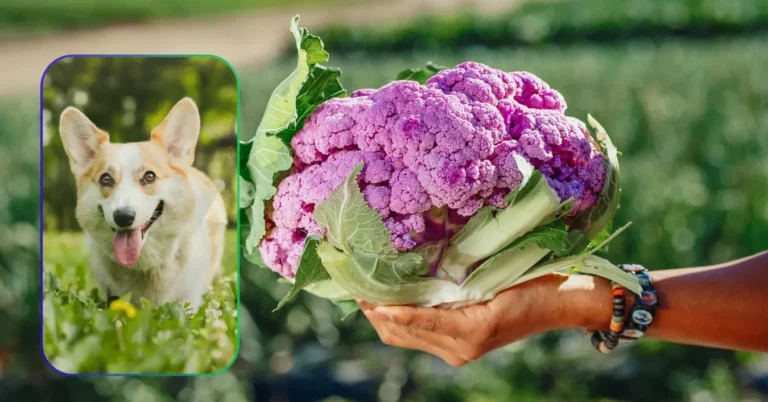Can dogs eat cauliflower? Cauliflower, whether you love it or despise it, is a nutritious vegetable that is high in vitamins and minerals. Is cauliflower safe to eat for dogs, and is it beneficial to them? We contacted a veterinarian to find out if cauliflower is good for dogs and how they can consume it without risk of illness.
Another Interesting Read: Can Dogs Eat Potatoes? Benefits And Risks Of Potatoes
Despite the fact that adding cauliflower to meals or giving it as a treat is generally fine, you must consider a few things before offering your dog cauliflower on a regular basis.
What Is Cauliflower?
Cauliflower is a member of the cruciferous vegetable family, which also includes broccoli, Brussels sprouts, and cabbage. Cauliflower is low in calories yet high in vitamins and fiber. It also contains phytonutrients that have been shown to have anti-inflammatory, antioxidant, and detoxifying properties.
The most common type of cauliflower is white, but it also comes in shades of orange, green, and purple. White cauliflower is the most widely available, but the other colors are becoming more common in supermarkets.
Cauliflower can be eaten raw or cooked. When cooked, it can be steamed, boiled, roasted, or stir-fried. It can also be mashed or puréed and used as a low-carbohydrate substitute for mashed potatoes.
Can Dogs Eat Cauliflower?
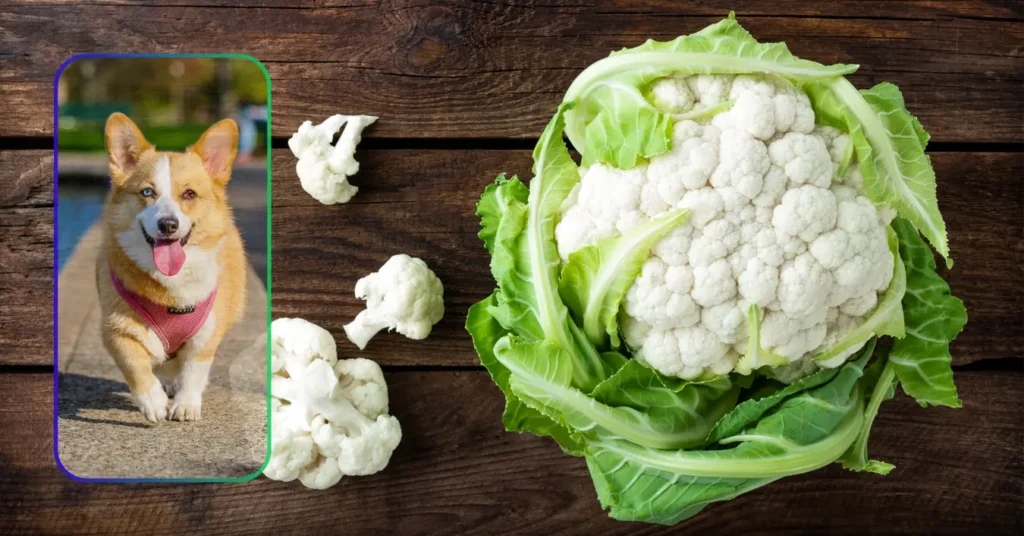
Yes, dogs can eat cauliflower. This vegetable is a healthy source of vitamins and minerals for your dog. However, as with any food, moderation is key. Too much cauliflower can cause gastrointestinal upset in your dog. When feeding cauliflower to your dog, be sure to cut it into small pieces to prevent choking. You can serve cauliflower raw, cooked, or roasted.
Cauliflower is entirely safe and non-toxic for dogs. Your canine companion can revel in the same nutritional perks we humans enjoy, such as fiber, antioxidants, Vitamin C, Vitamin K, Vitamin B6, folate, pantothenic acid, potassium, manganese, magnesium, phosphorus, choline, and sulforaphane. Additionally, being low in calories makes cauliflower an ideal snack for weight-conscious pups, with proper veterinary supervision, of course.
Despite the plethora of health benefits, it’s crucial to monitor the frequency of cauliflower snacks. Similar to other dog-friendly veggies like broccoli, Brussels sprouts, and cabbage, overindulgence in cauliflower can lead to increased flatulence and stomach discomfort due to its high fiber content.
Health Benefits Of Cauliflower For Dogs
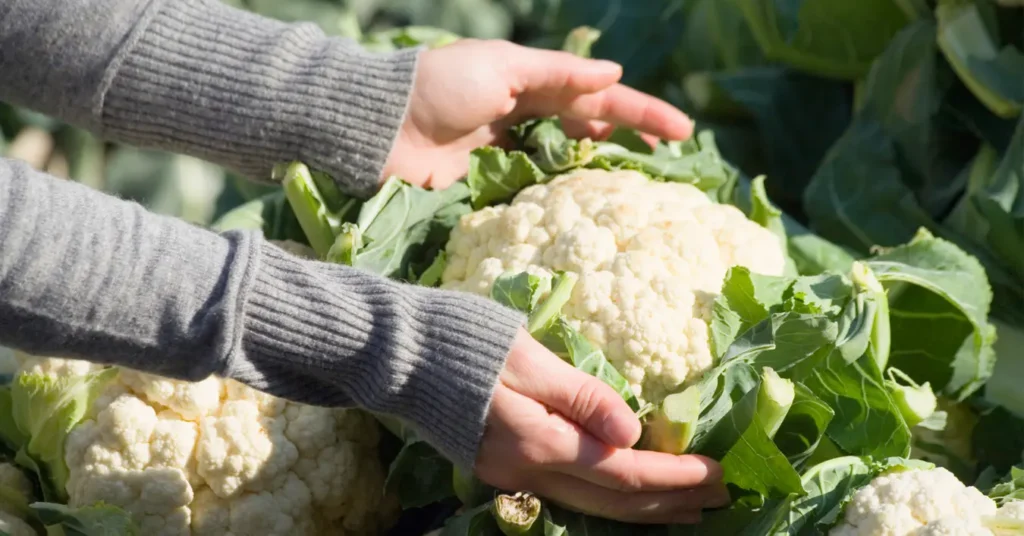
All of these vegetables offer health benefits for dogs, but cauliflower may be especially beneficial due to its high levels of vitamins, minerals, and antioxidants.
Some of the potential health benefits of cauliflower for dogs include:
1. Boosting the Immune System
Cauliflower is a great source of vitamin C, which is essential for a strong immune system. Vitamin C helps to protect the body against infection and disease. It also helps to reduce inflammation, which can be beneficial for conditions like arthritis.
2. Improving Digestion
Cauliflower is a good source of fiber, which is important for a healthy digestive system. Fiber helps to keep the bowel movements regular and can also help to relieve constipation and diarrhea.
3. Cancer Prevention
Some studies have shown that cauliflower may help to prevent cancer. This is due to the presence of compounds like sulforaphane, which have been shown to kill cancer cells and prevent them from spreading.
4. Heart Health
Cauliflower is a good source of potassium, which is important for heart health. Potassium helps to regulate blood pressure and keep the heart healthy. It also helps to reduce the risk of stroke and heart disease.
5. Brain Health
Cauliflower is a good source of choline, which is important for brain health. Choline is involved in the production of neurotransmitters and helps to protect the brain from damage. It also helps to improve memory and cognitive function.
Overall, cauliflower is a healthy vegetable that can offer many benefits for dogs. If you are looking for a way to boost your dog’s health, then adding cauliflower to their diet is a great option.
How To Prepare Cauliflower For Your Dog
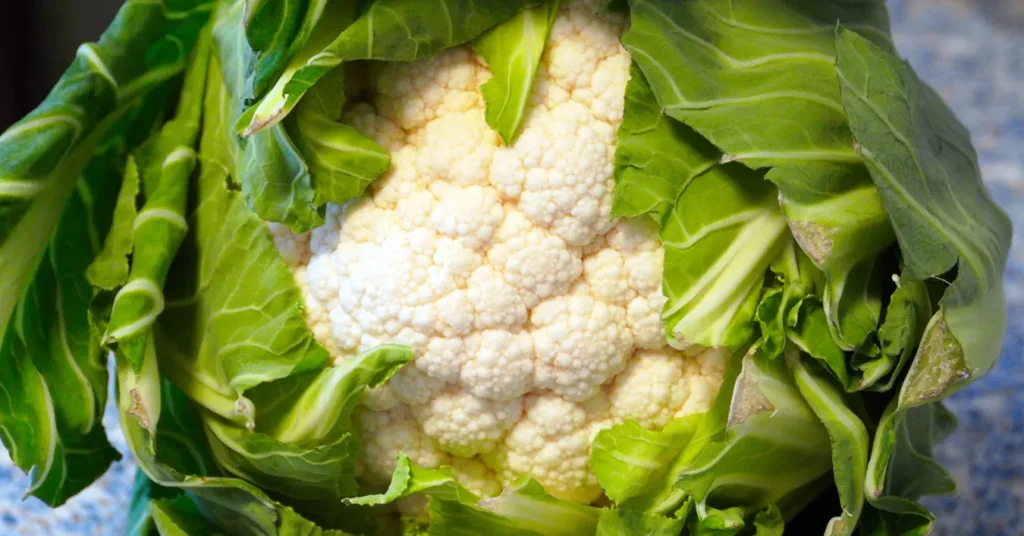
While cauliflower provides a myriad of nutrients, it should only constitute 10% of your dog’s diet as treats. The remaining 90% should be derived from a well-balanced dog food diet. Consider cauliflower treats as a delightful bonus, not a dietary staple.
Veterinary guidance is paramount, but here are general portion guidelines based on your dog’s size:
To mitigate choking hazards or intestinal blockages, chop cauliflower into small, bite-sized pieces.
Serving Suggestions and Safety Tips:
Feeding cauliflower to your dog can be done in various ways. Whether raw or cooked, without added salt or butter, it’s crucial to ensure the absence of toxic ingredients like garlic and onions. Steaming is a simple method for plain cooking. Allow it to cool before offering it to your dog to prevent any mouth burns.
Ways your pup can relish cauliflower:
When it comes to serving cauliflower to your dog, there aren’t stringent rules. It’s safe whether raw or cooked, be it boiled, steamed, or roasted. However, it should be served plain, devoid of oils, seasonings, or butter.
Nutritional Value Health Benefits of Cauliflowerr
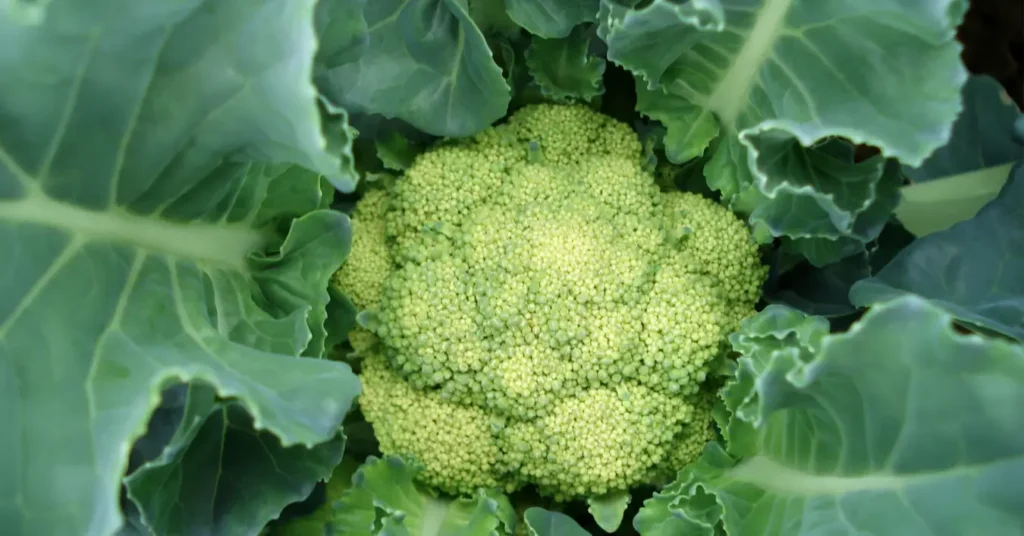
Cauliflower is a cruciferous vegetable that is low in calories but high in nutrients. One cup of cooked cauliflower contains only 25 calories, yet it is a good source of vitamins C, K, and B6, as well as folate and fiber. It also contains compounds that may have health benefits, such as sulforaphane.
Fiber: Cauliflower boasts a bounty of fiber, crucial for maintaining your dog’s digestive well-being. Insoluble fiber, steadfast as it traverses the intestines, acts as a virtuous escort for waste material, curbing stomach issues, constipation, and diarrhea.
Vitamins C, A, Beta-Carotene, and Folate: Potent antioxidants within cauliflower, these vitamins bestow anti-inflammatory prowess, fortify your dog’s immune system, and act as guardians against certain cancers and heart disease.
Vitamin K: This fat-soluble vitamin, a key player in blood clotting and bone metabolism, is a virtue found in cauliflower. It also plays a pivotal role in regulating blood calcium levels, mitigating the risk of heart disease.
Antioxidants: Cauliflower stands out as a high-achiever in the antioxidant domain. Battling against free radicals that induce oxidative cell damage, these antioxidants not only safeguard your dog’s health but also confer age-related and cognitive benefits.
Glucosinolates and Isothiocyanates: Phytonutrients present in cauliflower, these compounds provide formidable antioxidant protection. Their prowess extends to slowing cancer growth and diminishing the risk of heart disease and cognitive aging.
Carotenoids and Flavonoids: These plant-derived pigments regulate color and shield against sun damage, mitigating harm from environmental factors like pesticides, smoke, and air pollution.
Choline: Abundant in cauliflower, this vital nutrient detoxifies the liver and lends support to cognitive function and behavior.
Weight Loss: Fiber’s decelerating effect on digestion instills a sense of fullness after meals, reducing begging tendencies and aiding in weight loss. With low calories, no sugar, and high fiber content, cauliflower emerges as a commendable treat for obese or diabetic dogs.
Minerals: Essential minerals—potassium, calcium, magnesium, and manganese—are inherent in cauliflower, supporting your dog’s skeletal structure, fluid balance, cell function, the nervous system, and muscle function and integrity.
Is Cauliflower Safe For Dogs?
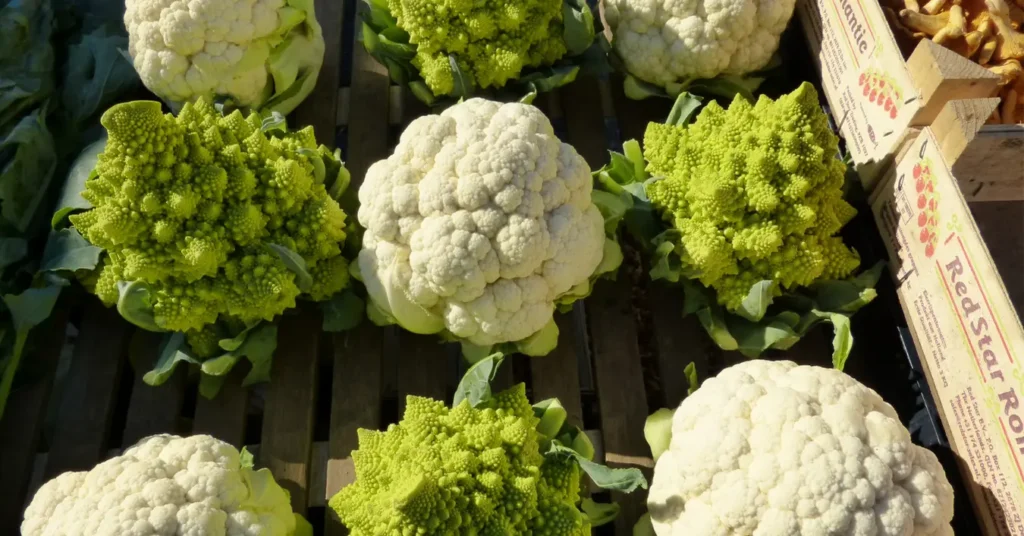
Cauliflower is a healthy vegetable for people, but is it safe for dogs? The answer is yes, cauliflower is safe for dogs to eat in moderation. This cruciferous vegetable is low in calories and fat, and high in fiber and vitamins C, K, and B6. It also contains antioxidants that can help boost your dog’s immune system.
While cauliflower is generally safe for dogs to eat, there are a few things to keep in mind.
1. Introduce cauliflower slowly into your dog’s diet.
Cauliflower is a member of the cruciferous vegetable family, which also includes broccoli, Brussels sprouts, and kale. These vegetables contain compounds that may be harmful to your dog if ingested in large quantities. To avoid potential problems, introduce cauliflower slowly into your dog’s diet and monitor their reaction. If they seem to tolerate it well, you can gradually increase the amount you feed them.
However, if they experience any digestive upset, discontinue feeding it to them and consult your veterinarian.
2. Some dogs may be allergic to cauliflower.
If your dog has never had cauliflower before, it’s best to introduce it slowly to see if there are any adverse reactions. Watch for signs of an allergic reaction, such as itchiness, swelling, or difficulty breathing, and contact your veterinarian if you notice any of these symptoms.
3. Cauliflower has chemicals that can affect a dog’s thyroid function.
The goitrogens in cauliflower can block the absorption of iodine, which is essential for the synthesis of thyroid hormones. This can lead to a decrease in thyroid hormone production and potentially cause hypothyroidism. While goitrogens are present in other vegetables, they are typically broken down during cooking. For this reason, it is best to avoid feeding raw cauliflower to dogs.
4. Cauliflower can cause gastrointestinal upset in some dogs.
Cauliflower is high in fiber, which can cause gas, bloating, and diarrhea in some dogs. If you notice your dog having any of these symptoms after eating cauliflower, discontinue feeding it to them and consult your veterinarian.
5. Cauliflower can be a choking hazard for dogs.
Cauliflower florets are the edible part of the plant, and they can be a choking hazard for dogs if they are not cut up into small pieces. To avoid this, make sure to chop the cauliflower into small bite-sized pieces before feeding it to your dog.
Overall, cauliflower is a safe and healthy vegetable for dogs to eat in moderation. Just be sure to introduce it slowly and watch for any potential adverse reactions. If you have any concerns, consult your veterinarian.
How To Feed Cauliflower Safely To Dogs
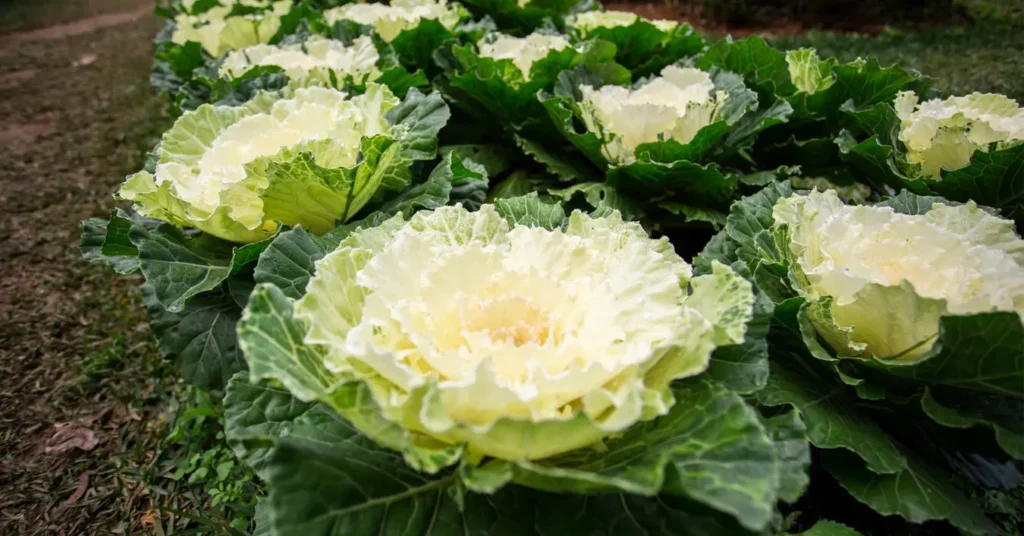
Cauliflower is a healthy vegetable that is often lauded for its nutritional value. It is a good source of fiber, vitamins, and minerals. Additionally, cauliflower contains compounds that may have health benefits, such as antioxidants and anti-inflammatory properties.
While cauliflower is generally considered safe for dogs to eat, there are a few things to keep in mind.
1. Feed in moderation
Cauliflower is a healthy vegetable and dogs can benefit from eating it. However, like all foods, it should be fed in moderation. When introducing cauliflower into your dog’s diet, start with a small amount to see how they tolerate it.
2. Avoid the stem and leaves
The stem and leaves of the cauliflower plant can be tough and hard to digest. Dogs may also have trouble digesting the compounds that give cauliflower its health benefits. For this reason, it’s best to avoid feeding the stem and leaves to your dog.
3. Cooked is better than raw
Dogs may have trouble digesting raw cauliflower. Cooking cauliflower will make it easier for your dog to digest and absorb its nutrients.
4 – Watch for signs of gastrointestinal upset
As with any new food, feeding cauliflower to your dog may cause gastrointestinal upset. Watch for signs of vomiting or diarrhea and stop feeding if your dog seems to be having any trouble.
5. Talk to your veterinarian
If you have any concerns about feeding cauliflower to your dog, or if your dog is not tolerating it well, talk to your veterinarian. They can provide guidance on how to safely introduce this vegetable into your dog’s diet.
Is Cauliflower a Healthy Choice for Dogs?
Given that cauliflower poses no toxicity risk and is a low-calorie, nutrient-rich vegetable, it can be an excellent occasional treat for your pet.
According to Dr. Sara Ochoa, DVM, a veterinarian at Whitehouse Veterinary Hospital, cauliflower is rich in fiber, vitamin C, vitamin K, calcium, potassium, and folate. She advises against incorporating it into their daily diet but suggests a few times a week is ideal.
In essence, if your dog happens to raid your groceries and indulges in a head of cauliflower, there’s likely no need to panic. Just be prepared for a potential upset stomach.
Dr. Ochoa cautions that excessive cauliflower consumption can lead to gas and stomach discomfort in dogs. If you suspect your pup went overboard on this veggie, monitor them closely. In most cases, the discomfort will subside on its own, though if you’re concerned, reaching out to your vet is a prudent step.
Explore Other Healthy Veggies for Dogs
Craving variety for your canine companion? There’s a garden full of dog-friendly veggies waiting to be explored (in moderation, of course!). Consider these alternatives to keep your pup’s treat time diverse:
Remember, always check with your vet to ensure your dog’s health condition aligns with the safe consumption of these leafy greens and their garden companions.
Conclusion | Can Dogs Eat Cauliflower?
Cauliflower is a healthy vegetable that is often lauded for its nutritional value. It is a good source of fiber, vitamins, and minerals. Additionally, cauliflower contains compounds that may have health benefits, such as antioxidants and anti-inflammatory properties. While cauliflower is generally considered safe for dogs to eat, there are a few things to keep in mind, such as feeding in moderation and avoiding the stem and leaves.
Additionally, cooked cauliflower is better than raw for dogs to digest. If you have any concerns about feeding cauliflower to your dog, talk to your veterinarian.
You Might Also Like:
